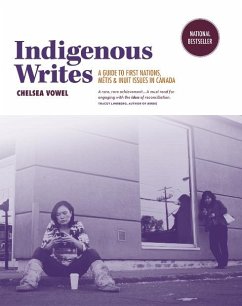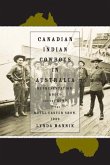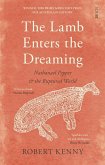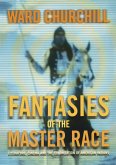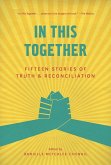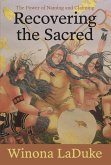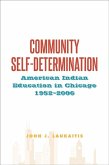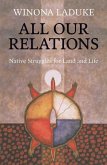- Broschiertes Buch
- Merkliste
- Auf die Merkliste
- Bewerten Bewerten
- Teilen
- Produkt teilen
- Produkterinnerung
- Produkterinnerung
Canada, Canada 150, TRC, Indigenous, first nations
Andere Kunden interessierten sich auch für
![Canadian Indian Cowboys in Australia Canadian Indian Cowboys in Australia]() Lynda MannikCanadian Indian Cowboys in Australia30,99 €
Lynda MannikCanadian Indian Cowboys in Australia30,99 €![The Lamb Enters the Dreaming The Lamb Enters the Dreaming]() Robert KennyThe Lamb Enters the Dreaming17,99 €
Robert KennyThe Lamb Enters the Dreaming17,99 €![Fantasies of the Master Race Fantasies of the Master Race]() Ward ChurchillFantasies of the Master Race20,99 €
Ward ChurchillFantasies of the Master Race20,99 €![In This Together In This Together]() In This Together15,99 €
In This Together15,99 €![Recovering the Sacred Recovering the Sacred]() Winona LadukeRecovering the Sacred20,99 €
Winona LadukeRecovering the Sacred20,99 €![Community Self-Determination Community Self-Determination]() John J LaukaitisCommunity Self-Determination41,99 €
John J LaukaitisCommunity Self-Determination41,99 €![All Our Relations All Our Relations]() Winona LadukeAll Our Relations18,99 €
Winona LadukeAll Our Relations18,99 €-
-
-
Canada, Canada 150, TRC, Indigenous, first nations
Hinweis: Dieser Artikel kann nur an eine deutsche Lieferadresse ausgeliefert werden.
Hinweis: Dieser Artikel kann nur an eine deutsche Lieferadresse ausgeliefert werden.
Produktdetails
- Produktdetails
- Verlag: Portage & Main Press
- Seitenzahl: 291
- Erscheinungstermin: 9. September 2016
- Englisch
- Abmessung: 228mm x 179mm x 25mm
- Gewicht: 559g
- ISBN-13: 9781553796800
- ISBN-10: 1553796802
- Artikelnr.: 46502542
- Herstellerkennzeichnung
- Libri GmbH
- Europaallee 1
- 36244 Bad Hersfeld
- gpsr@libri.de
- Verlag: Portage & Main Press
- Seitenzahl: 291
- Erscheinungstermin: 9. September 2016
- Englisch
- Abmessung: 228mm x 179mm x 25mm
- Gewicht: 559g
- ISBN-13: 9781553796800
- ISBN-10: 1553796802
- Artikelnr.: 46502542
- Herstellerkennzeichnung
- Libri GmbH
- Europaallee 1
- 36244 Bad Hersfeld
- gpsr@libri.de
Chelsea Vowel is Métis from manitow-sâkahikan (Lac Ste. Anne) Alberta, residing in amiskwacîwâskihikan (Edmonton). Mother to six girls, she has a BEd, an LLB, and a MA, and is a Cree language instructor at the Faculty of Native Studies at the University of Alberta. Chelsea is a public intellectual, writer, and educator whose work intersects language, gender, Métis self-determination, and resurgence. Author of Indigenous Writes: A Guide to First Nations, Métis & Inuit Issues in Canada, she and her co-host Molly Swain produce the Indigenous feminist sci-fi podcast Métis in Space, and co-founded the Métis in Space Land Trust. Chelsea blogs at apihtawikosisan.com and makes legendary bannock.
Contents
kinanâskomitinâwâw/Acknowledgments
Introduction: How to Read This Book
Part 1. The Terminology of Relationships
1. Just Don’t Call Us Late for Supper Names for Indigenous Peoples
2. Settling on a Name Names for Non-Indigenous Canadians
Part 2. Culture and Identity
1. Got Status? Indian Status in Canada
2. You’re Métis? Which of Your Parents Is an Indian? Métis Identity
3. Feel the Inukness Inuit Identity
4. Hunter-Gatherers or Trapper-Harvesters? Why Some Terms Matter
5. Allowably Indigenous: To Ptarmigan or Not to Ptarmigan When
Indigeneity Is Transgressive
6. Caught in the Crossfire of Blood-Quantum Reasoning Popular Notions of
Indigenous Purity
7. What Is Cultural Appropriation? Respecting Cultural Boundaries
8. Check the Tag on That “Indian” Story How to Find Authentic Indigenous
Stories
9. Icewine, Roquefort Cheese, and the Navajo Nation Indigenous Use of
Intellectual Property Laws
10. All My Queer Relations Language, Culture, and Two-Spirit Identity
Part 3. Myth-Busting
1. The Myth of Progress
2. The Myth of the Level Playing Field
3. The Myth of Taxation
4. The Myth of Free Housing
5. The Myth of the Drunken Indian
6. The Myth of the Wandering Nomad
7. The Myth of Authenticity
Part 4. State Violence
1. Monster The Residential-School Legacy
2. Our Stolen Generations The Sixties and Millennial Scoops
3. Human Flagpoles Inuit Relocation
4. From Hunters to Farmers Indigenous Farming on the Prairies
5. Dirty Water, Dirty Secrets Drinking Water in First Nations
Communities
6. No Justice, No Peace The Royal Commission on Aboriginal Peoples
Part 5. Land, Learning, Law, and Treaties
1. Rights? What Rights? Doctrines of Colonialism
2. Treaty Talk The Evolution of Treaty-Making in Canada
3. The More Things Change, the More They Stay the Same Numbered Treaties
and Modern Treaty-Making
4. Why Don’t First Nations Just Leave the Reserve? Reserves Are Not the
Problem
5. White Paper, What Paper? More Attempts to Assimilate Indigenous
Peoples
6. Our Children, Our Schools Fighting for Control Over Indigenous
Education
kinanâskomitinâwâw/Acknowledgments
Introduction: How to Read This Book
Part 1. The Terminology of Relationships
1. Just Don’t Call Us Late for Supper Names for Indigenous Peoples
2. Settling on a Name Names for Non-Indigenous Canadians
Part 2. Culture and Identity
1. Got Status? Indian Status in Canada
2. You’re Métis? Which of Your Parents Is an Indian? Métis Identity
3. Feel the Inukness Inuit Identity
4. Hunter-Gatherers or Trapper-Harvesters? Why Some Terms Matter
5. Allowably Indigenous: To Ptarmigan or Not to Ptarmigan When
Indigeneity Is Transgressive
6. Caught in the Crossfire of Blood-Quantum Reasoning Popular Notions of
Indigenous Purity
7. What Is Cultural Appropriation? Respecting Cultural Boundaries
8. Check the Tag on That “Indian” Story How to Find Authentic Indigenous
Stories
9. Icewine, Roquefort Cheese, and the Navajo Nation Indigenous Use of
Intellectual Property Laws
10. All My Queer Relations Language, Culture, and Two-Spirit Identity
Part 3. Myth-Busting
1. The Myth of Progress
2. The Myth of the Level Playing Field
3. The Myth of Taxation
4. The Myth of Free Housing
5. The Myth of the Drunken Indian
6. The Myth of the Wandering Nomad
7. The Myth of Authenticity
Part 4. State Violence
1. Monster The Residential-School Legacy
2. Our Stolen Generations The Sixties and Millennial Scoops
3. Human Flagpoles Inuit Relocation
4. From Hunters to Farmers Indigenous Farming on the Prairies
5. Dirty Water, Dirty Secrets Drinking Water in First Nations
Communities
6. No Justice, No Peace The Royal Commission on Aboriginal Peoples
Part 5. Land, Learning, Law, and Treaties
1. Rights? What Rights? Doctrines of Colonialism
2. Treaty Talk The Evolution of Treaty-Making in Canada
3. The More Things Change, the More They Stay the Same Numbered Treaties
and Modern Treaty-Making
4. Why Don’t First Nations Just Leave the Reserve? Reserves Are Not the
Problem
5. White Paper, What Paper? More Attempts to Assimilate Indigenous
Peoples
6. Our Children, Our Schools Fighting for Control Over Indigenous
Education
Contents
kinanâskomitinâwâw/Acknowledgments
Introduction: How to Read This Book
Part 1. The Terminology of Relationships
1. Just Don’t Call Us Late for Supper Names for Indigenous Peoples
2. Settling on a Name Names for Non-Indigenous Canadians
Part 2. Culture and Identity
1. Got Status? Indian Status in Canada
2. You’re Métis? Which of Your Parents Is an Indian? Métis Identity
3. Feel the Inukness Inuit Identity
4. Hunter-Gatherers or Trapper-Harvesters? Why Some Terms Matter
5. Allowably Indigenous: To Ptarmigan or Not to Ptarmigan When
Indigeneity Is Transgressive
6. Caught in the Crossfire of Blood-Quantum Reasoning Popular Notions of
Indigenous Purity
7. What Is Cultural Appropriation? Respecting Cultural Boundaries
8. Check the Tag on That “Indian” Story How to Find Authentic Indigenous
Stories
9. Icewine, Roquefort Cheese, and the Navajo Nation Indigenous Use of
Intellectual Property Laws
10. All My Queer Relations Language, Culture, and Two-Spirit Identity
Part 3. Myth-Busting
1. The Myth of Progress
2. The Myth of the Level Playing Field
3. The Myth of Taxation
4. The Myth of Free Housing
5. The Myth of the Drunken Indian
6. The Myth of the Wandering Nomad
7. The Myth of Authenticity
Part 4. State Violence
1. Monster The Residential-School Legacy
2. Our Stolen Generations The Sixties and Millennial Scoops
3. Human Flagpoles Inuit Relocation
4. From Hunters to Farmers Indigenous Farming on the Prairies
5. Dirty Water, Dirty Secrets Drinking Water in First Nations
Communities
6. No Justice, No Peace The Royal Commission on Aboriginal Peoples
Part 5. Land, Learning, Law, and Treaties
1. Rights? What Rights? Doctrines of Colonialism
2. Treaty Talk The Evolution of Treaty-Making in Canada
3. The More Things Change, the More They Stay the Same Numbered Treaties
and Modern Treaty-Making
4. Why Don’t First Nations Just Leave the Reserve? Reserves Are Not the
Problem
5. White Paper, What Paper? More Attempts to Assimilate Indigenous
Peoples
6. Our Children, Our Schools Fighting for Control Over Indigenous
Education
kinanâskomitinâwâw/Acknowledgments
Introduction: How to Read This Book
Part 1. The Terminology of Relationships
1. Just Don’t Call Us Late for Supper Names for Indigenous Peoples
2. Settling on a Name Names for Non-Indigenous Canadians
Part 2. Culture and Identity
1. Got Status? Indian Status in Canada
2. You’re Métis? Which of Your Parents Is an Indian? Métis Identity
3. Feel the Inukness Inuit Identity
4. Hunter-Gatherers or Trapper-Harvesters? Why Some Terms Matter
5. Allowably Indigenous: To Ptarmigan or Not to Ptarmigan When
Indigeneity Is Transgressive
6. Caught in the Crossfire of Blood-Quantum Reasoning Popular Notions of
Indigenous Purity
7. What Is Cultural Appropriation? Respecting Cultural Boundaries
8. Check the Tag on That “Indian” Story How to Find Authentic Indigenous
Stories
9. Icewine, Roquefort Cheese, and the Navajo Nation Indigenous Use of
Intellectual Property Laws
10. All My Queer Relations Language, Culture, and Two-Spirit Identity
Part 3. Myth-Busting
1. The Myth of Progress
2. The Myth of the Level Playing Field
3. The Myth of Taxation
4. The Myth of Free Housing
5. The Myth of the Drunken Indian
6. The Myth of the Wandering Nomad
7. The Myth of Authenticity
Part 4. State Violence
1. Monster The Residential-School Legacy
2. Our Stolen Generations The Sixties and Millennial Scoops
3. Human Flagpoles Inuit Relocation
4. From Hunters to Farmers Indigenous Farming on the Prairies
5. Dirty Water, Dirty Secrets Drinking Water in First Nations
Communities
6. No Justice, No Peace The Royal Commission on Aboriginal Peoples
Part 5. Land, Learning, Law, and Treaties
1. Rights? What Rights? Doctrines of Colonialism
2. Treaty Talk The Evolution of Treaty-Making in Canada
3. The More Things Change, the More They Stay the Same Numbered Treaties
and Modern Treaty-Making
4. Why Don’t First Nations Just Leave the Reserve? Reserves Are Not the
Problem
5. White Paper, What Paper? More Attempts to Assimilate Indigenous
Peoples
6. Our Children, Our Schools Fighting for Control Over Indigenous
Education

